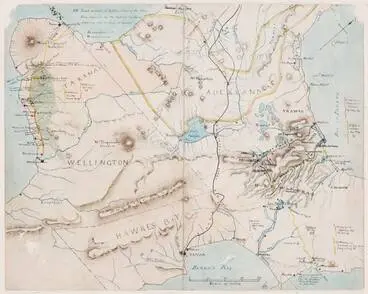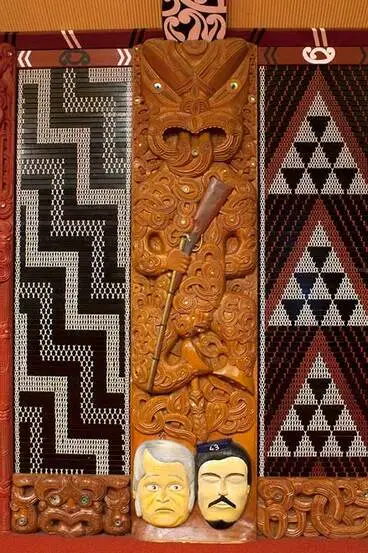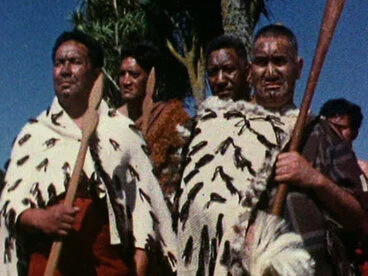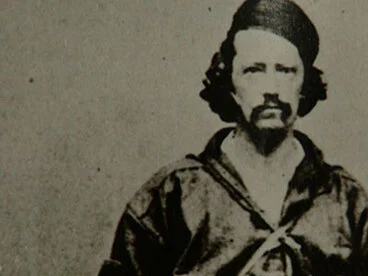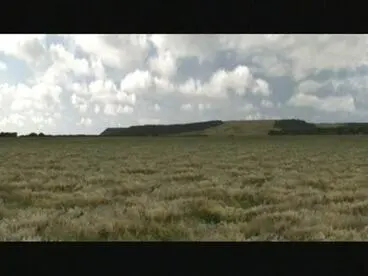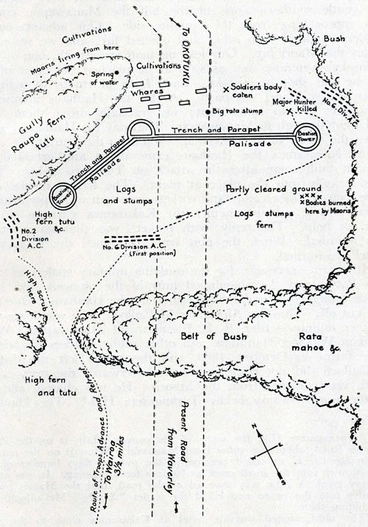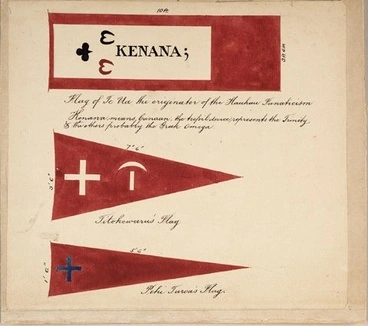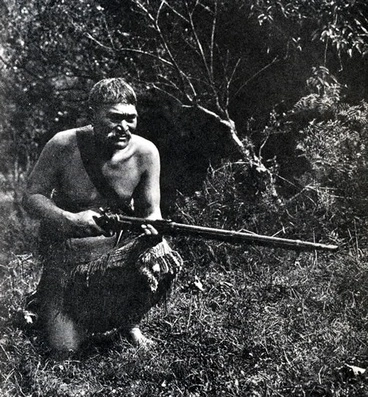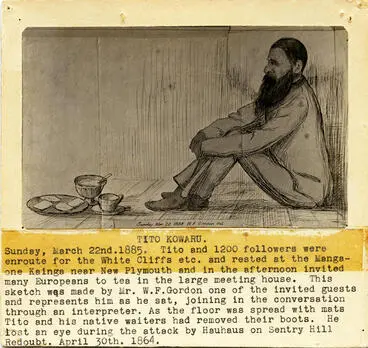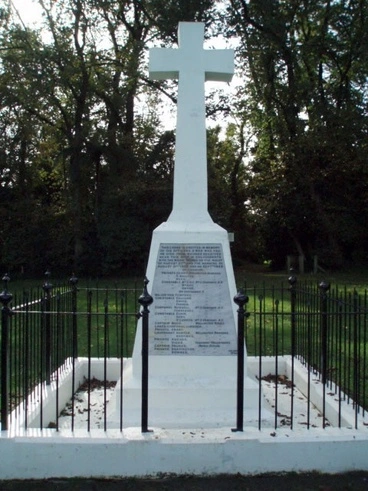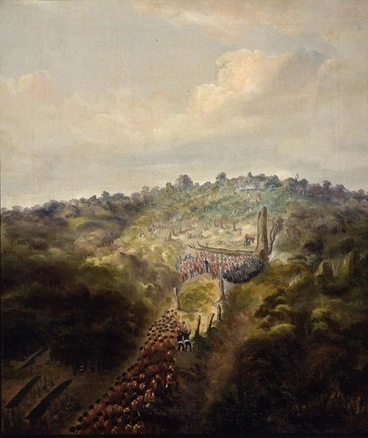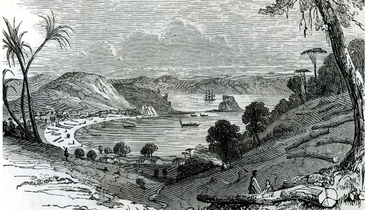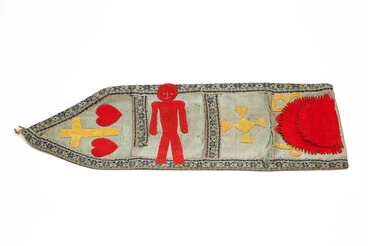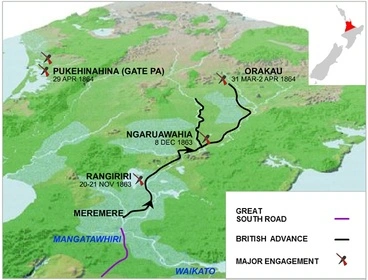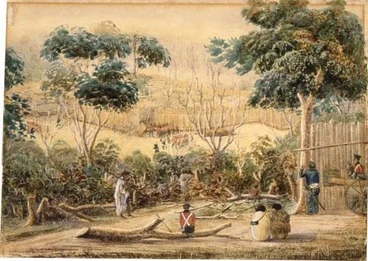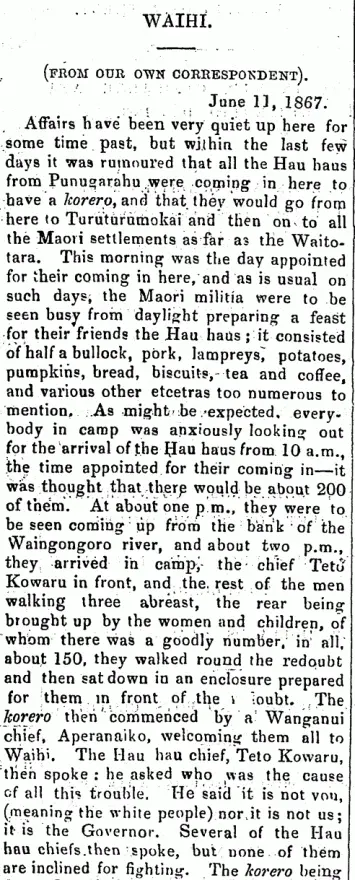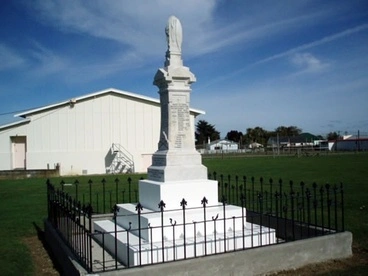The story of Tītokowaru 1868-69
A DigitalNZ Story by National Library of New Zealand Topics
Ngā Ruahine leader Riwha Tītokowaru is known as one of Aotearoa New Zealand's best military leaders. In the South Taranaki campaign (fought over the confiscation of land) between 1868-69, he never lost a battle. SCIS no. 1966268
social_sciences, arts, english, history, health, Māori, technology
Map showing Tītokowaru's southern Taranaki campaigns
Manatū Taonga, the Ministry for Culture and Heritage
Tītokowaru
Manatū Taonga, the Ministry for Culture and Heritage
'I shall not die'
Services to Schools
New Zealand Wars (1840s-1870s)
Services to Schools
Ngā Pakanga O Aotearoa: The New Zealand Wars
Services to Schools
Tītokowaru's war - Tītokowaru's war
Manatū Taonga, the Ministry for Culture and Heritage
Beginning of Tītokowaru's war
Manatū Taonga, the Ministry for Culture and Heritage
The Killing of Kane
NZ On Screen
Ko Titokowaru: te poupou rangatira Titokowaru: a carved panel of the Taranaki leader: Tuhinga 25
Museum of New Zealand Te Papa Tongarewa
Von Tempsky's Ghost
NZ On Screen
Battle of Moturoa
Manatū Taonga, the Ministry for Culture and Heritage
Moturoa battle plan
Manatū Taonga, the Ministry for Culture and Heritage
Tutange Waionui
Manatū Taonga, the Ministry for Culture and Heritage
Titokowaru, Riwha
Manatū Taonga, the Ministry for Culture and Heritage
TITOKOWARU AT PARIHAKA. (Star, 28 December 1885)
National Library of New Zealand
DTe Ngutu-o-te-Manu. (Hawera & Normanby Star, 07 September 1908)
National Library of New Zealand
YON TEMPSKY'S DEATH (Hawera & Normanby Star, 26 September 1908)
National Library of New Zealand
Page two and three of letter from Riwha Titokowaru to his tribe ("I shall not die")
Alexander Turnbull Library
Titokowaru
Puke Ariki
Titokowaru's "Peace Army." (Manawatu Standard, 07 January 1885)
National Library of New Zealand
Taurangahika Pa, Section of outer Trench and Pallisades [Sic]
Museum of New Zealand Te Papa Tongarewa
Titokowaru by Moana and The Moahunters
Services to Schools
Tauranga-Ika: a revisionist view of Tītokowaru's last feint
Services to Schools
Jackie’s song
Services to Schools
Crate Day at historical site worries iwi leader
Services to Schools
The affair at Handley’s Woolshed
Services to Schools
Titokowaru was a significant warrior chief
Services to Schools
Military operations against the rebel natives
Services to Schools
Titokowaru’s dilemma: an interview with Marian Maguire
Services to Schools
A new generation learns about Tītokowaru's war
Services to Schools
New Zealand Wars (Part 2)
Services to Schools
The adventures of Kimble Bent by James Cowan
Services to Schools
Cultural interactions in 1800s NZ
Services to Schools
Tauranga Ika marae
Services to Schools
Tītokowaru never lost his mana, but historians took it
Services to Schools
Ngati Ruanui Claims Settlement Bill — third reading
Services to Schools
Kimble Bent: The strange part he played in the South Taranaki Wars
Services to Schools
The reverse at Moturoa
Services to Schools
New Zealand Wars
Services to Schools
The New Zealand Wars: Ngā Pakanga o Aotearoa
Services to Schools
Tauranga-ika pā
Artist Alfred Woolnoth captured this scene from outside Tauranga-ika pā. The empty pā can only mean that it had just been abandoned by Tītokowaru and his supporters on 3 February 1869. The pā was a masterpiece of construction. Each of the four concave sides had a strong point, while a maze of trenches and bomb-proof shelters made it easy for men to move around it. Was it fear, adultery or war-weariness that caused Tītokowaru and his warriors to abandon the pā? These are some questions historians have debated over many years. The conflict at Tauranga-ika pā ended Tītokowaru’s campaign in South Taranaki.
Alexander Turnbull Library
Thomas McDonnell was prominent in Tītokowaru’s 1868-69 campaign. He attacked Tītokowaru’s stronghold in Te Ngutu-o-te-Manu three times without success and blamed his subordinates for his defeat. McDonnell was then replaced by his rival George Whitmore. In anger, he wrote recriminatory letters to the Government, for which he was dismissed on 14 October 1868. In December he apologised to the government and returned to the war against Tītokowaru, this time as a subordinate to Whitmore. But success was not to be. He suffered yet another defeat in February 1868 and McDonnell resigned on 18 February 1869.
Colonel Thomas McDonnell
Alexander Turnbull Library
I shall not die
This 3-page letter was written by Tītokowaru in 1868 in part to strike fear in the minds of the local settlers. Tītokowaru proclaiming to have developed a craving for human flesh was a warning to the settlers they may end up in his cooking pot. He mentions that he has already eaten Pākehā Trooper Smith. However, Tītokowaru was a very religious man and not a cannibal. This would have gone against his mana. This letter, however, allowed the colonial press to declare him and his supporters as ‘fiends in human shape’.
Alexander Turnbull Library
Te Keepa Te Rangihiwinui, was also known as Te Keepa, or Major Kemp. Kemp and his men were active in the campaign against Tītokowaru, who seemed to be winning the war against the settlers in South Taranaki. The turning point in the war came when Tauranga-ika pā was abandoned. Te Keepa and his group of Māori and Pākehā soldiers were sent in pursuit of Tītokowaru. The chase continued for several weeks through the thick bush but Tītokowaru managed to avoid capture by escaping into the upper Waitara area.
Te Keepa Te Rangihiwinui
Alexander Turnbull Library
Ngatau Omahuru also known as William Fox
Dressed formally in an Eton suit and fine boots, this young boy looks somewhat out of place and unhappy with his surroundings. The story goes Ngātau was abducted before the battle of Te Ngutu-o-te-manu by a man called Pirimoana, who was part of the Māori kupapa (Māori who fought for the British). Ngātau spent some time in the Native Hostelry in Wellington before being adopted by Premier William Fox and his wife Sarah. This happened despite his parents being alive. Kidnappings between Māori and Pākehā did occur, as a kind of ‘natural justice’. William Fox grew up to be a law clerk. Many years later he returned to Mawhitiwhiti to reunite with his parents Hinewai and Te Karere.
Alexander Turnbull Library
War in Tauranga 1864
DigitalNZ
The Story of Rua Kēnana, 1916
DigitalNZ
The story of Te Kooti 1868-73
DigitalNZ
Parihaka
DigitalNZ
Report of Tītokowaru meeting at Waihī
Manatū Taonga, the Ministry for Culture and Heritage
Normanby NZ Wars memorial
Manatū Taonga, the Ministry for Culture and Heritage
War and peace at Te Ngutu o te Manu
Services to Schools
